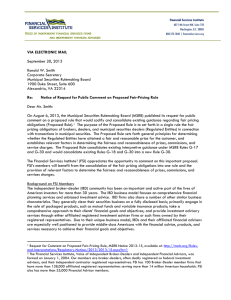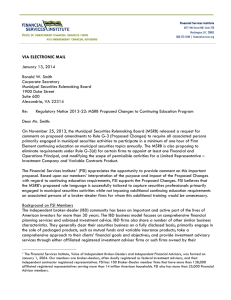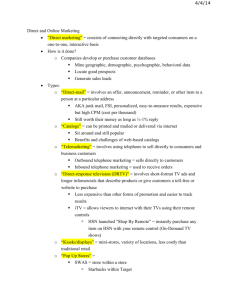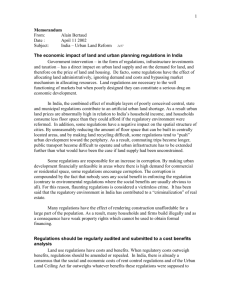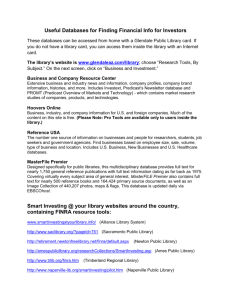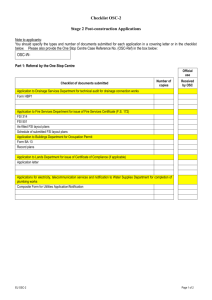VIA ELECTRONIC MAIL May 6, 2013 Ronald W. Smith
advertisement
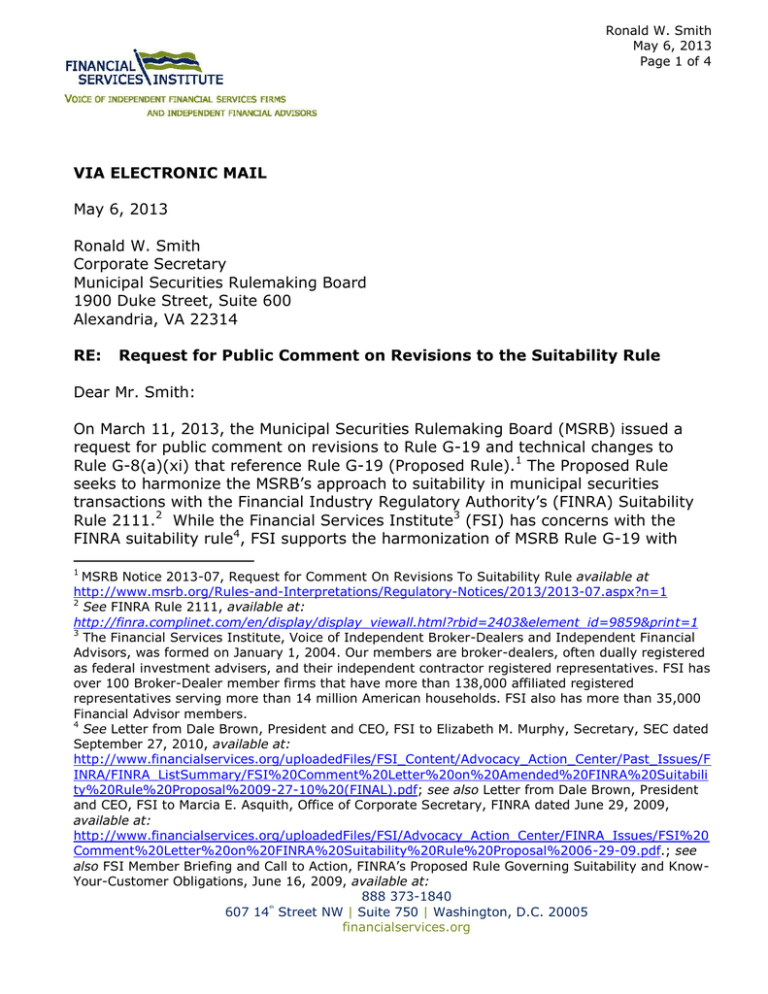
Ronald W. Smith May 6, 2013 Page 1 of 4 VIA ELECTRONIC MAIL May 6, 2013 Ronald W. Smith Corporate Secretary Municipal Securities Rulemaking Board 1900 Duke Street, Suite 600 Alexandria, VA 22314 RE: Request for Public Comment on Revisions to the Suitability Rule Dear Mr. Smith: On March 11, 2013, the Municipal Securities Rulemaking Board (MSRB) issued a request for public comment on revisions to Rule G-19 and technical changes to Rule G-8(a)(xi) that reference Rule G-19 (Proposed Rule).1 The Proposed Rule seeks to harmonize the MSRB’s approach to suitability in municipal securities transactions with the Financial Industry Regulatory Authority’s (FINRA) Suitability Rule 2111.2 While the Financial Services Institute3 (FSI) has concerns with the FINRA suitability rule4, FSI supports the harmonization of MSRB Rule G-19 with 1 MSRB Notice 2013-07, Request for Comment On Revisions To Suitability Rule available at http://www.msrb.org/Rules-and-Interpretations/Regulatory-Notices/2013/2013-07.aspx?n=1 2 See FINRA Rule 2111, available at: http://finra.complinet.com/en/display/display_viewall.html?rbid=2403&element_id=9859&print=1 3 The Financial Services Institute, Voice of Independent Broker-Dealers and Independent Financial Advisors, was formed on January 1, 2004. Our members are broker-dealers, often dually registered as federal investment advisers, and their independent contractor registered representatives. FSI has over 100 Broker-Dealer member firms that have more than 138,000 affiliated registered representatives serving more than 14 million American households. FSI also has more than 35,000 Financial Advisor members. 4 See Letter from Dale Brown, President and CEO, FSI to Elizabeth M. Murphy, Secretary, SEC dated September 27, 2010, available at: http://www.financialservices.org/uploadedFiles/FSI_Content/Advocacy_Action_Center/Past_Issues/F INRA/FINRA_ListSummary/FSI%20Comment%20Letter%20on%20Amended%20FINRA%20Suitabili ty%20Rule%20Proposal%2009-27-10%20(FINAL).pdf; see also Letter from Dale Brown, President and CEO, FSI to Marcia E. Asquith, Office of Corporate Secretary, FINRA dated June 29, 2009, available at: http://www.financialservices.org/uploadedFiles/FSI/Advocacy_Action_Center/FINRA_Issues/FSI%20 Comment%20Letter%20on%20FINRA%20Suitability%20Rule%20Proposal%2006-29-09.pdf.; see also FSI Member Briefing and Call to Action, FINRA’s Proposed Rule Governing Suitability and KnowYour-Customer Obligations, June 16, 2009, available at: 888 373-1840 607 14 Street NW | Suite 750 | Washington, D.C. 20005 financialservices.org th Ronald W. Smith May 6, 2013 Page 2 of 4 FINRA Rule 2111 and encourages the MSRB to make further changes to its rulebook to align its rules more closely with the FINRA Rules. FSI and its members believe that further harmonization between the rulebooks of the two self-regulatory organizations (SROs) will promote more effective compliance by regulated entities. Background on FSI Members The independent broker-dealer (“IBD”) community has been an important and active part of the lives of American investors for more than 30 years. The IBD business model focuses on comprehensive financial planning services and unbiased investment advice. IBD firms also share a number of other similar business characteristics. They generally clear their securities business on a fully disclosed basis; engage primarily in the sale of packaged products, such as mutual funds and variable insurance products; take a comprehensive approach to their clients’ financial goals and objectives; and provide investment advisory services through either affiliated registered investment adviser firms or such firms owned by their registered representatives. Due to their unique business model, IBDs and their affiliated financial advisers are especially well positioned to provide middle-class Americans with the financial advice, products, and services necessary to achieve their financial goals and objectives. In the U.S., approximately 201,000 independent financial advisers, or approximately 64 percent of all practicing registered representatives, operate in the IBD channel.5 These financial advisers are self-employed independent contractors, rather than employees of the IBD firms. These financial advisers provide comprehensive and affordable financial services that help millions of individuals, families, small businesses, associations, organizations, and retirement plans with financial education, planning, implementation, and investment monitoring. Clients of independent financial advisers are typically “main street America” it is, essentially part of the “charter” of the independent channel. The core market of advisers affiliated with IBDs is comprised of clients who have tens and hundreds of thousands as opposed to millions of dollars to invest. Independent financial advisers are entrepreneurial business owners who typically have strong ties, visibility, and individual name recognition within their communities and client base. Most of their new clients come through referrals from existing clients or other centers of influence.6 Independent financial advisers get to know their clients personally and provide them investment advice in face-to-face meetings. Due to their close ties to the communities in which they operate their small businesses, http://www.financialservices.org/uploadedFiles/FSI/Advocacy_Action_Center/FINRA_Issues/Member _Briefing_on_FINRA_Proposed_Suitability_Rule_06-16-09.pdf 5 Cerulli Associates at http://www.cerulli.com/. 6 These “centers of influence” may include lawyers, accountants, human resources managers, or other trusted advisers. 888 373-1840 607 14 Street NW | Suite 750 | Washington, D.C. 20005 financialservices.org th Ronald W. Smith May 6, 2013 Page 3 of 4 these financial advisers have a strong incentive to make the achievement of their clients’ investment objectives their primary goal. FSI is the advocacy organization for IBDs and independent financial advisers. Member firms formed FSI to improve their compliance efforts and promote the IBD business model. FSI is committed to preserving the valuable role that IBDs and independent advisers play in helping Americans plan for and achieve their financial goals. FSI’s primary goal is to insure our members operate in a regulatory environment that is fair and balanced. FSI’s advocacy efforts on behalf of our members include industry surveys, research, and outreach to legislators, regulators, and policymakers. FSI also provides our members with an appropriate forum to share best practices in an effort to improve their compliance, operations, and marketing efforts. FSI’s membership is actively involved in the municipal securities marketplace. Within this space, FSI's members are primarily involved in the secondary market for municipal securities. A small number of FSI members also underwrite municipal securities and/or are municipal advisors. Comments As a general principle, FSI supports the harmonization of FINRA and MSRB rules and processes. As a result, FSI supports the current effort by the MSRB to harmonize Rule G-19 with FINRA Rule 2111. While FSI has concerns with the FINRA suitability rule, the harmonization of the two rules is a positive development for FSI’s membership. Financial advisers are involved in the trading of equities, corporate bonds, and other instruments covered by FINRA Rule 2111, in addition to engaging in the secondary market trading of municipal securities governed by Rule G-19. The harmonization of these two standards will provide significant benefits for broker-dealers and financial advisors. These benefits are reflected in the ease associated with complying with one suitability standard across a wide range of financial instruments, including municipal securities. Investors will also benefit from this change by having a greater understanding of the standard of care owed to them by their financial adviser, regardless of the specific security they are buying or selling. Therefore, FSI believes the harmonization of Rule G-19 under the Proposed Rule is a positive development. FSI and its members look forward to further harmonization efforts by the MSRB in the future. Conclusion We remain committed to constructive engagement in the regulatory process and welcome the opportunity to work with the MSRB to achieve a sensible balance between investor protection and regulation in the municipal securities market. 888 373-1840 607 14 Street NW | Suite 750 | Washington, D.C. 20005 financialservices.org th Ronald W. Smith May 6, 2013 Page 4 of 4 Thank you for your consideration of our comments. Should you have any questions, please contact me directly at (202) 803-6061. Respectfully submitted, David T. Bellaire, Esq. Executive Vice President & General Counsel 888 373-1840 607 14 Street NW | Suite 750 | Washington, D.C. 20005 financialservices.org th
